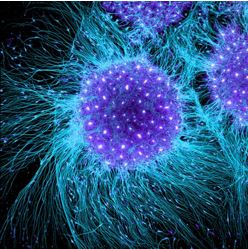Creative Biolabs is a full-service provider of cellular analysis. Relying on the state of art technology platform and profound expertise, we offer a comprehensive range of veterinary cellular analysis services and customized services to address the specific needs of our customers.

Cells are basic units of biological function and are therefore at the origin of a large number of studies to identify and understand many basic biochemical and physical processes of life. The veterinary cellular analysis enables the study of cell biology, its relationship to disease pathology, and the development of novel small molecules, biological therapies, and cell-based therapies. Based on our diverse scientific expertise and technology platform, we support veterinary cellular analysis on the protein, small molecule, and whole-cell level.
Creative Biolabs has extensive experience in cellular analysis and diverse technology platforms, including flow cytometry, cell sorting, in vitro or in vivo imaging, proteomic microarray, cell-based microarray, SDS-PAGE gel electrophoresis, Western blot, etc. We offer a range of cellular analysis research solutions, including:
Creative Biolabs' technical experts will help you choose the best service to fit your specific needs. For more details on how we can provide innovative support to your project, please feel free to contact us.
Other optional ECIA™ cellular analysis services:
Veterinary cellular analysis involves examining cells from animal tissues to diagnose health conditions, monitor diseases, or evaluate treatment effectiveness. This analysis is critical for identifying infections, cancer, inflammatory conditions, and other pathologies in animals, using techniques like cytology, flow cytometry, and molecular diagnostics.
Flow cytometry is used in veterinary medicine to analyze the characteristics of blood cells and other types of cells. It helps in diagnosing blood disorders, immune diseases, and cancers by quantifying cell populations and assessing cellular properties like DNA content, cell size, and the presence of tumor markers.
Cellular analysis can detect viral infections by identifying characteristic changes in cells affected by viruses or by directly detecting viral particles. Techniques such as immunocytochemistry and in situ hybridization are used to visualize viral antigens or nucleic acids within cells, aiding in the diagnosis of infections like parvovirus in dogs or feline leukemia virus.
Cytological techniques involve examining slides of cells under a microscope to assess general health or diagnose conditions. Routine uses include screening for inflammatory processes, checking for infections in ear or skin swabs, and guiding the diagnosis of tumors or cysts through fine-needle aspirate samples.
Recent advancements in veterinary cellular analysis include digital cytology, where images of cell samples are analyzed using computer algorithms to provide faster and potentially more accurate diagnoses. Additionally, the integration of molecular techniques like PCR has enhanced the ability to detect and characterize diseases at the cellular level.
Use the resources in our library to help you understand your options and make critical decisions for your study.
All listed services and products are For Research Use Only. Do Not use in any diagnostic or therapeutic applications.
| USA:
Europe: Germany: |
|
|
Call us at: USA: UK: Germany: |
|
|
Fax:
|
|
| Email: info@creative-biolabs.com |
